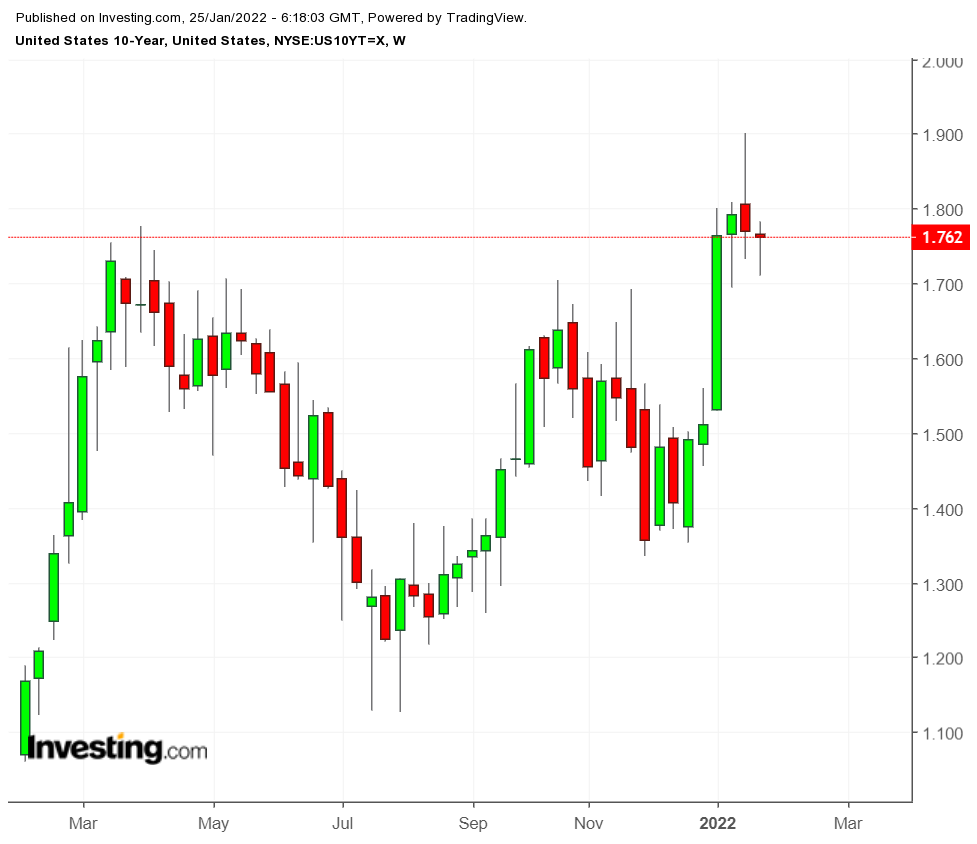A perfect storm of an imminent rise in interest rates, unabated inflation, surging infections from the COVID-19 Omicron variant, and the growing possibility Russia will invade Ukraine has unsettled investors, prompting them to sell off risk assets and shift to US Treasuries.
Stock markets tanked into correction territory before a late recovery on Monday and NATO put troops on standby to defend Ukraine's eastern border from a Russian invasion that intelligence sources are seeing as increasingly likely. The US and UK started withdrawing embassy staff from Kyiv, Ukraine's capital, evacuating diplomatic families and urging citizens to leave the country. As well, Washington put 8,500 troops on high alert.

Yields on the benchmark 10-year Treasury note continued to decline yesterday, reaching 1.71% before bobbing up to 1.77% in late trading. The yield topped 1.89% last week. Yields move inversely to prices, so the decline indicated investors were moving into the safety of government bonds.
As yields on the 10-year Treasury decline, those on the shorter two- and five-year maturities were up about a quarter percentage point in anticipation of Fed rate hikes this year to stave off inflation.
Analysts last week were blaming a rise in yields for the stock market selloff. The Treasury yield seemed to herald continued inflation and higher interest rates as the Federal Reserve acts belatedly to curb inflation. But Monday’s activity seemed more motivated by shifting away from risk assets.
Geopolitical Tensions Trigger Flight To Bond Havens
The geopolitical tensions have lent some urgency to financial markets as a wobbly US response starts to resemble appeasement and some fear that for all the rhetoric, Washington will fold if Moscow moves into Ukraine.
China, too, is rattling sabers, sending its largest contingent of warplanes so far this year to buzz Taiwan. The island republic’s defense ministry said 39 planes entered its air defense zone. Taiwan scrambled its own jets to monitor the incursion and activated its missile-defense systems.
In Europe, eurozone government bond yields also declined amid the Ukraine tensions. Italian lawmakers began voting for president in a complicated procedure that requires a two-thirds majority until the fourth round. Prime Minister Mario Draghi is likely to win but it may not be until Thursday, and Italy is always good for a surprise.
Meanwhile, the Federal Open Market Committee is poised for a pivotal meeting as it is widely expected to announce its first rate hike since December 2018 for March after it speeds up the reduction of its bond purchases.
The policy committee could also indicate when it will start running off its bond portfolio by reducing its reinvestment of maturing bonds.
The composite purchasing managers index from IHS Markit, a proxy for economic activity announced on Monday, hit an 18-month low in January, declining to 50.8 from 57.0 in December, indicating a marginal expansion as the economy has ground to a virtual standstill. IHS Markit attributed the slowdown to supply-chain delays and staff shortages, due in large part to illness and COVID restrictions.
Fed Board Nominations Lag
The number of members on the seven-seat board of governors has dwindled to four as tardy nominations wind their way through a Senate confirmation process, and two of the 12 regional banks are seeking new presidents.
The FOMC is structured to give a permanent majority to the Washington-based board’s seven members versus five voting members from the regional banks. It hardly matters since consensus rules in the committee, but currently the tables are turned with five regional bank presidents voting along with the four board members.
